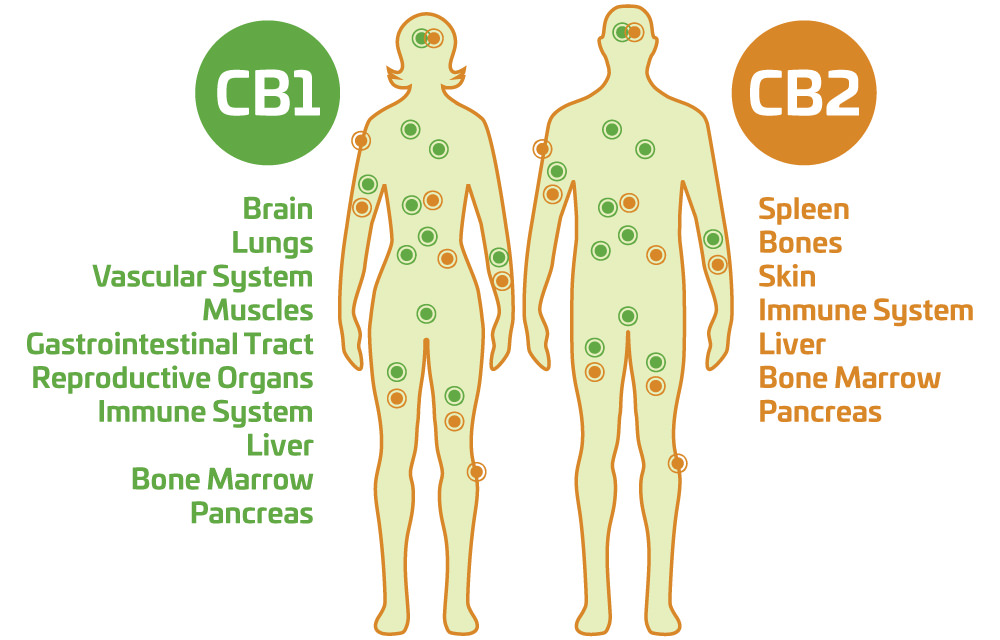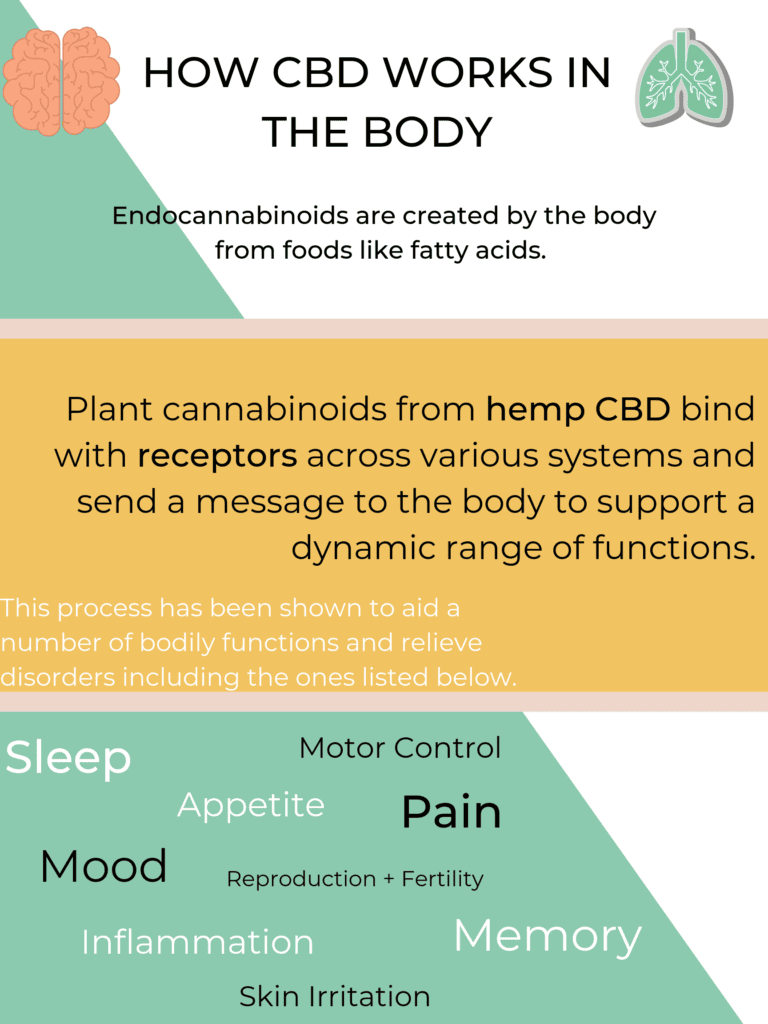CBD Oil for Gastrointestinal Disorders
Summarize

Along with diet and exercise, CBD oil can help improve gut health. It’s essential because your gut, or gastrointestinal system, is the center of the health of your body (1).
Research shows that the balance of bacteria in your gut is key to maintaining health in your heart, skin, and mind (2). Read below to learn about how your stomach works, about CBD oil, and how CBD oil can help your belly today.
Fast facts about the gut
The digestive system is a complicated system of various organs that work together to digest and absorb nutrients from food. Bacteria found in the stomach, also known as the gut microbiome, help to digest the food you eat (3).
However, when this gut microbiome is out of balance, it can increase your risk of chronic conditions (4).
Besides eating antioxidants in your diet, supplements could provide a more natural treatment for gut health symptoms rather than taking a pill each day.
About CBD oil
CBD oil, also known as cannabidiol oil, usually comes from industrial hemp (9). CBD is extracted from the plant and then added to carrier oil. Cannabidiol comes from a group of compounds called cannabinoids. These compounds do not produce a psychoactive high like other cannabinoids, like THC (tetrahydrocannabinol).
How does CBD work in the body?
Research shows that CBD’s interaction with a system of compounds called endocannabinoids plays a role in controlling discomfort. CBD’s activity on CB2 receptors plays a vital role in immune function.

CBD oil and the digestive system
CB2 receptors show promise to be therapeutic targets for treating certain gastrointestinal conditions. In such conditions CBD may help with certain secretory and motility disorders of the gut (11).
More extensive studies are needed to confirm the role of CBD. However, research shows that, for now, it’s safe to say that the endocannabinoid system plays a protective role in the gut (12). It means it could help reduce digestive symptoms like:
- Nausea
- Vomiting
- Diarrhea
- Loss of appetite
CBD oil and leaky gut
In a healthy gut, the barrier between the inside of the intestines and the bloodstream is tight to prevent the contents of the organs from leaking into the bloodstream (15). These contents at any time may include partially digested food, bacteria, or other toxins that the body is trying to rid of.
However, sometimes, a poor diet, genetics, or some digestive conditions can put some people at risk for holes in their intestinal lining. This condition is often known as a leaky gut since waste products and food particles can leak into the bloodstream. A leaky gut can cause symptoms like:
- Chronic constipation or diarrhea
- Bloating
- Fatigue
- Cognitive issues like difficulty concentrating or confusion
- Skin problems
- Nutritional deficiencies likely due to malabsorption
A 2017 cell study looked at the impact of CBD on intestinal barrier function. The study treated a specific type of cells damaged by the C. difficile with CBD. Study results show that CBD helped stop the cell death process and restore cell barrier integrity through the CB1 receptor (16).

Are all CBD products helpful in improving gut health?
CBD oil may not help everyone since they could be some side effects for some. Medical experts report that some side effects of CBD include (19,20):
- nausea
- fatigue
- irritability
- dry mouth
- diarrhea
- reduced appetite
- It can increase the level of blood thinner in your blood.
Also, besides the above side effects, you may not always get the purest forms of CBD in some products. This lack of purity or potency can impact the effectiveness of some CBD products in improving gut health symptoms. The uncertainty of some CBD products is due to many CBD products not being regulated by the Food and Drug Administration (FDA).
Summary
CBD oil is taking the wellness arena by storm and for a good reason. It can improve the quality of life in people with a variety of digestive issues. However, the use of CBD oil in such treatments should not replace any prescribed regimens just yet.
It’s because more needs to be learned about its mechanism in the body first. However, since research results so far are promising, using CBD oil as a supplement to your current regimen may help if changes in your diet or prescription medicines aren’t resolving all your symptoms.
Disclaimer: Be sure to consult with a qualified healthcare provider before adding CBD oil to your daily routine. Also, never stop taking prescription medicines without physician approval.
References
- Bliss, E.S. and Whiteside, E. (July 2018) “The Gut-Brain Axis, the Human Gut Microbiota and Their Integration in the Development of Obesity.” Front Physiol., 9:900.
- National Institute of Digestive Diseases (December 2017) “Your Digestive System & How it Works.”
- Salem, I., Ramser, A., Isham, N., and Ghannoum, M.A. (July 2018) “The Gut Microbiome as a Major Regulator of the Gut-Skin Axis.” Front Microbiol.,, 9:1459.
- Clapp, M., et al. (September 2017) “Gut microbiota’s effect on mental health: The gut-brain axis.” Clin Pract., 7(4):987.
- Johnson, J. (reviewed by Debra Rose Wilson, PhD, MSN, RN, IBCLC, AHN-BC, CHT July 29, 2018) “Does CBD oil work for chronic management?” Medical News Today
- Fine, P.G. and Rosenfeld, M.J. (October 2013) “The endocannabinoid system, cannabinoids.” Rambam Maimonides Med J., 4(4): e0022.
- Goyal, H., Singla, U., Gupta, U., and May, E. (February 2017) “Role of cannabis in digestive disorders.” European Journal of Gastroenterology and Hepatology, 29(2): 135-143.
- Hasenoehrl, C., Taschler, U., Storr, M., and Schicho, R. (December 2016) “The gastrointestinal tract – a central organ of cannabinoid signaling in health and disease.” Neurogastroenterol Motil., 28(12):1765-1780.
- Mayo Clinic (October 4, 2019) “Ulcerative colitis.”
- Campos, M.D., M. (September 22, 2017) “Leaky gut: What is it, and what does it mean for you?” Harvard Health Publishing Harvard Health Publishing Harvard Medical School
- Eske, J. (reviewed by August 21, 2019) “What to know about leaky gut syndrome.” Medical News Today
- Gigli, S., et al. (December 2017) “Cannabidiol restores intestinal barrier dysfunction and inhibits the apoptotic process induced by Clostridium difficile toxin A in Caco-2 cells.” United European Gastroenterol J., 5(8):1108-1115.
- Gotfried, J., Kataria, R., and Schey, R. (October 2017) “Review: The Role of Cannabinoids on Esophageal Function-What We Know Thus Far.” Cannabis Cannabinoid Res., 2(1):252-258.
- Grinspoon, M.D., P. (August 24, 2018) “Cannabidiol (CBD)-what we know and what we don’t.” Harvard Health Publishing Harvard Medical School
- Bauer, M.D., B., A. (December 20, 2018) “What are the benefits of CBD- and is it safe to use?” Mayo Clinic
The statements above have not been evaluated via the Food and Drug Administration. The efficacy of these merchandise has not been tested by using FDA-approved research. These products are not intended to diagnose, treat, therapy or stop any disease.
Share this post


alexc
We should be aware of this CBD oil cause it would be a huge help for gastrointestinal disorders. This would really mean a lot for everyone. Thanks for sharing this great article.
Alex Malkin
AlexC, thank you for your feedback.